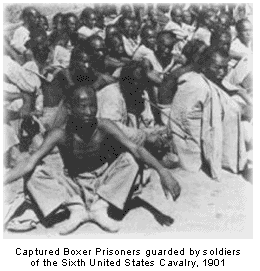Commercial concessions had been forced on China dating to the end of the Opium Wars (1839-1842), a contrived series of conflicts engineered by British trading interests. France, Germany and Russia later demanded and received similar treatment.
Paramount among the great powers’ requirements was the granting of treaty ports and extraterritorial status.
 China was later divided into spheres of influence in the aftermath of the First Sino-Japanese War (1894-95), allowing outside nations even greater latitude. Understandably, the Chinese deeply resented the presence of the great powers and the weakness of their own government. China had effectively lost its independence.
One reaction to this exploitation was the emergence of a clandestine martial arts society referred to by the English as the “Boxers” (their Chinese name being translated as “righteous harmonious fists”). The nativist group launched a series of attacks against foreigners, Chinese Christians and complicit government officials. The high point of the rebellion occurred in mid-1900, when Beijing was occupied by 140,000 Boxers. They laid siege to the British legation, which harbored most of the international community. The entrenched foreigners held out for two months until a hastily arranged multinational military force managed to break the siege, scattering the Boxers.
As a result of the Boxer Rebellion, China was subjected to even greater humiliation. An indemnity of more than $300 million was levied on the nearly bankrupt nation and the government was forced to allow the permanent quartering of foreign soldiers in Beijing.
The United States attempted to mitigate some of the financial damage from the Boxer Rebellion by later using much of its share of the reparations to fund scholarships for Chinese students studying in America.
From the international perspective, the Boxer Rebellion increased support for the Open Door policy. The great powers realized that warring among themselves would inhibit their ability to exploit China.
The Opium Wars, (1839-1842), were the first attempt by the weak Chinese government to eliminate the opium trade that had been thrust upon them by British traders. The British merchants illicitly brought the opium into China from India, against Chinese laws, to pay for the "trade goods" they wanted.
The Chinese did want to sell their Porcelain and silk but they had no desire to "Trade" with the foreigners. The Chinese produced everything they needed themselves and considered foreign products to be of inferior quality. Overwhelmed by the Western military response, the Chinese were humiliated by having to pay reparations and allow concessions to the Western powers that effectively denied them control over their own country.
China was later divided into spheres of influence in the aftermath of the First Sino-Japanese War (1894-95), allowing outside nations even greater latitude. Understandably, the Chinese deeply resented the presence of the great powers and the weakness of their own government. China had effectively lost its independence.
One reaction to this exploitation was the emergence of a clandestine martial arts society referred to by the English as the “Boxers” (their Chinese name being translated as “righteous harmonious fists”). The nativist group launched a series of attacks against foreigners, Chinese Christians and complicit government officials. The high point of the rebellion occurred in mid-1900, when Beijing was occupied by 140,000 Boxers. They laid siege to the British legation, which harbored most of the international community. The entrenched foreigners held out for two months until a hastily arranged multinational military force managed to break the siege, scattering the Boxers.
As a result of the Boxer Rebellion, China was subjected to even greater humiliation. An indemnity of more than $300 million was levied on the nearly bankrupt nation and the government was forced to allow the permanent quartering of foreign soldiers in Beijing.
The United States attempted to mitigate some of the financial damage from the Boxer Rebellion by later using much of its share of the reparations to fund scholarships for Chinese students studying in America.
From the international perspective, the Boxer Rebellion increased support for the Open Door policy. The great powers realized that warring among themselves would inhibit their ability to exploit China.
The Opium Wars, (1839-1842), were the first attempt by the weak Chinese government to eliminate the opium trade that had been thrust upon them by British traders. The British merchants illicitly brought the opium into China from India, against Chinese laws, to pay for the "trade goods" they wanted.
The Chinese did want to sell their Porcelain and silk but they had no desire to "Trade" with the foreigners. The Chinese produced everything they needed themselves and considered foreign products to be of inferior quality. Overwhelmed by the Western military response, the Chinese were humiliated by having to pay reparations and allow concessions to the Western powers that effectively denied them control over their own country.